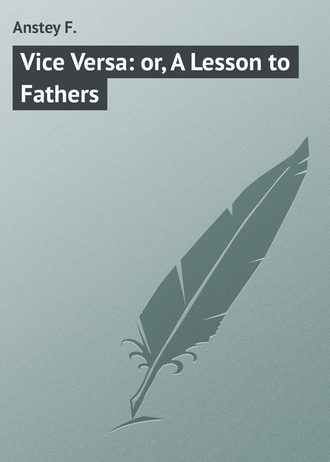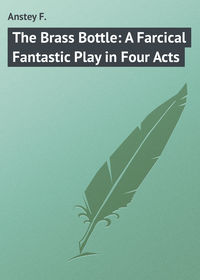 полная версия
полная версияVice Versa: or, A Lesson to Fathers
"Richard," said Mr. Bultitude, in answer to the look, "you have not done much to deserve consideration at my hands."
"Or at mine!" added the Doctor ominously.
"No," said Dick, "I know I haven't. I've been a brute. I deserve a jolly good licking."
"You do," said his father, but in spite of his indignation, the broken-down look of the boy, and the memory of his own sensations when waiting to be caned that morning, moved him to pity. And then Dick had shown some compunction in the billiard-room: he was not entirely lost to feeling.
"Well," he said at last, "you've acted very wrongly. Because I thought it best that you should not – ahem, leave your studies for this party, you chose to disobey me and alarm your master by defying my orders and coming home by stealth – that was your object, I presume?"
"Y – yes," said Dick, looking rather puzzled, but seeing that he was expected to agree; "that was it."
"You know as well as I do what good cause I have to be angry; but, if I consent to overlook your conduct this time, if I ask Dr. Grimstone to overlook it too" (the Doctor made an inarticulate protest, while Dick stared, incredulous), "will you undertake to behave better for the future – will you?"
Dick's voice broke at this, and his eyes swam – he was effectually conquered. "Oh, I will!" he cried, "I will, really. I never meant to go so far when I began."
"Then, Dr. Grimstone," said Paul, "you will do me a great favour if you will take no further notice of this. You see the boy is sorry, and I am sure he will apologise to you amply for the grave slight he has done you. And by the way – I should have mentioned it before – but he will have to leave your care at the end of the term for a public school – I intend to send him to Harrow, so he will require some additional preparation, perhaps: I may leave that in your hands?"
Dr. Grimstone looked deeply offended, but he only said, "I will see to that myself, my dear sir. I am sorry you did not tell me this earlier. But, may I suggest that a large public school has its pitfalls for a boy of your son's disposition? And I trust this leniency may not have evil consequences, but I doubt it – I greatly doubt it."
As for Dick, he ran to his father, and hung gratefully on to his arm with a remorseful hug, a thing he had never dared to do, or thought of attempting, in his life till then.
"Dad," he said in a choked voice, "you're a brick! I don't deserve any of it, but I'll never forget this as long as I live."
Mr. Bultitude too, felt something spring up in his heart which drew him towards the boy in an altogether novel manner, but no one will say that either was the worse for it.
"Well," he said mildly, "prove to me that I have made no mistake. Go back to Crichton House now, work and play well, and try to keep out of mischief for the rest of the term. I trust to you," he added, in a lower tone, "while you remain at Market Rodwell, to keep my – my connection with it a secret; you owe that at least to me. You may probably have – ahem, some inconveniences to put up with – inconveniences you are not prepared for. You must bear them as your punishment."
And soon afterwards a cab was called, and Dr. Grimstone prepared to return to Market Rodwell, with the deserter, by the last train.
As Paul shook hands through the cab window with his prodigal son, he repeated his warning. "Mind," he said, "you have been at school all this past week; you have run away to attend this party, you understand? Good-bye, my boy, and here's something to put in your pocket, and another for Jolland; but he need not know it comes from me." And when Dick opened his hand afterwards, he found two half-sovereigns in it.
So the cab rolled away, and Paul went up to the drawing-room, where, although he certainly allowed the fireworks on the balcony and in the garden to languish forgotten on their sticks, he led all the other revels up to an advanced hour with jovial abandon quite worthy of Dick, and none of his little guests ever suspected the change of host.
When it was all over, and the sleepy children had driven off, Paul sat down in an easy chair by the bright fire which sparkled frostily in his bedroom, to think gratefully over all the events of the day – events which were beginning already to take an unreal and fantastic shape.
Bitterly as he had suffered, and in spite of the just anger and thirst for revenge with which he had returned, I am glad to say he did not regret the spirit of mildness that had stayed his hand when his hour of triumph came.
His experiences, unpleasant as they had been, had had their advantages: they had drawn him and his family closer together.
In his daughter Barbara, as she wished him good-night (knowing nothing, of course, of the escape), he had suddenly become aware of a girlish freshness and grace he had never looked for or cared to see before. Roly after this, too, had a claim upon him he could never wish to forget, and even with the graceless Dick there was a warmer and more natural feeling on both sides – a strange result, no doubt, of such unfilial behaviour, but so it was.
Mr. Bultitude would never after this consider his family as a set of troublesome and thankless incumbrances; thanks to Dick's offices during the interregnum, they would henceforth throw off their reserve and constraint in their father's presence, and in so doing, open his eyes to qualities of which he had hitherto been in contented ignorance.
It would be pleasanter perhaps to take leave of Mr. Bultitude thus, as he sits by his bedroom fire in the first flush of supreme and unalloyed content.
But I feel almost bound to point out a fact which few will find any difficulty in accepting, namely, that, although the wrong had been retrieved without scandal or exposure, for which Paul could not be too thankful, there were many consequences which could not but survive it.
Neither father nor son found himself exactly in the same position as before their exchange of characters.
It took Mr. Bultitude considerable time and trouble to repair all the damage his son's boyish excesses had wrought both at Westbourne Terrace and in the City. He found the discipline of his clerks' room and counting-house sorely relaxed, and his office-boy in particular attempted a tone towards him of such atrocious familiarity that he was indignantly dismissed, much to his astonishment, the very first day. And probably Paul will never quite clear himself of the cloud that hangs over a man of business who, in the course of however well regulated a career, is known to have been at least once "a little odd."
And his home, too, was distinctly demoralised: his cook was an artist, unrivalled at soups and entrées; but he had to get rid of her notwithstanding.
It was only too evident that she looked upon herself as the prospective mistress of his household, and he did not feel called upon as a parent to fulfil any expectations which Dick's youthful cupboard love had unintentionally excited.
For some time, as fresh proof of Dick's extravagances came home to him, Paul found it cost him no little effort to restrain a tendency to his former bitterness and resentment, but he valued the new understanding between himself and his son too highly to risk losing it again by any open reproach, and so with each succeeding discovery the victory over his feelings became easier.
As for Dick, he found the inconveniences at which his father had hinted anything but imaginary, as will perhaps be easily understood.
It was an unpleasant shock to discover that in one short week his father had contrived somehow to procure him a lasting unpopularity. He was obviously looked upon by all, masters and boys, as a confirmed coward and sneak. And although some of his companions could not fairly reproach him on the latter score, the imputation was particularly galling to Dick, who had always treated such practices with sturdy contempt.
He was sorely tempted at times to right himself by declaring the real state of the case; but he remembered his promise and his father's unexpected clemency and his gratitude always kept him silent.
He never quite understood how it was that the whole school seemed to have an impression that they could kick and assault him generally with perfect impunity; but a few very unsuccessful experiments convinced them that this was a popular error on their part.
Although, however, in everything else he did gradually succeed in recovering all the ground his father had lost him, yet there was one respect in which, I am sorry to say, he found all his efforts to retrieve himself hopeless.
His little sweetheart, with the grey eyes and soft brown hair, cruelly refused to have anything more to do with him. For Dulcie's pride had been wounded by what she considered his shameless perfidy on that memorable Saturday by the parallel bars; the last lingering traces of affection had vanished before Paul's ingratitude on the following Monday, and she never forgave him.
She did not even give him an opportunity of explaining himself, never by word or sign up to the last day of the term showing that she was even aware of his return. What was worse, in her resentment she transferred her favour to Tipping, who became her humble slave for a too brief period; after which he was found wanting in polish, and was ignominiously thrown over for the shy new boy Kiffin, whose head Dick found a certain melancholy pleasure in punching in consequence.
This was Dick's punishment, and a very real and heavy one he found it. He is at Harrow now, where he is doing fairly well; but I think there are moments even yet when Dulcie's charming little face, her pretty confidences, and her chilling disdain, are remembered with something as nearly resembling a heartache as a healthy unsentimental boy can allow himself.
Perhaps, if some day he goes back once more to Crichton House "to see the fellows," this time with the mysterious glamour of a great public school about him, he may yet obtain forgiveness, for she is getting horribly tired of Kiffin, who, to tell the truth, is something of a milksop.
As for the Garudâ Stone, I really cannot say what has become of it. Perhaps it was dashed to pieces on the cobble-stones of the stables behind the terrace, and a good thing too. Perhaps it was not, and is still in existence, with all its dangerous powers as ready for use as ever it was; and in that case the best I can wish my readers is, that they may be mercifully preserved from finding it anywhere, or if they are unfortunate enough to come upon it, that they may at least be more careful with it than Mr. Paul Bultitude, by whose melancholy example I trust they will take timely warning.
And with these very sincere wishes I beg to bid them a reluctant farewell.









